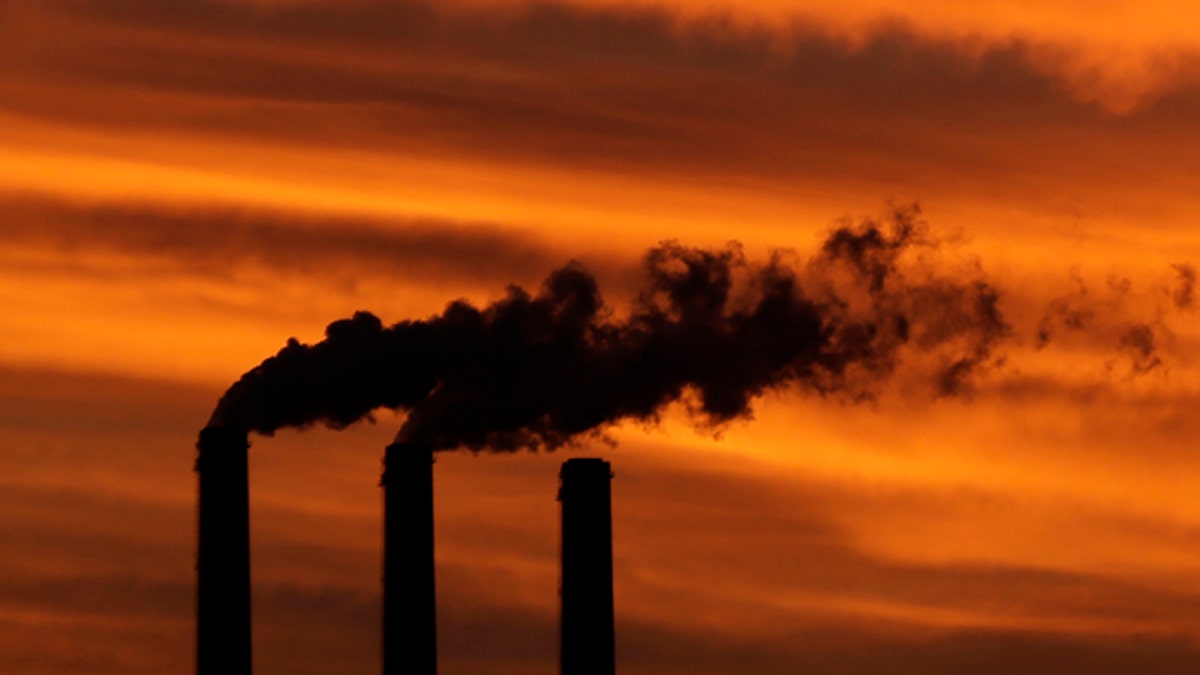
FILE - In this Dec. 2, 2012 file photo, smoke billows from smokestacks near Emmett, Kansas. The Environmental Protection Agency (EPA) wants to set tougher new limits on smokestack emissions from nearly two dozen states that burden downwind areas with air pollution from power plants they can't control. (AP Photo/Charlie Riedel, File)
If the Trump administration is going to repeal and replace any one policy, here’s my nominee: Let’s shift environmental rules away from government-regulated energy standards and toward taxing goods and services responsible for the most pollution.
Done right, the shift would cost less and reduce pollution more, without hurting lower-income families more than wealthier Americans.
You can find economists on opposite sides of many issues, but this is one area where most of us agree: taxes that target pollution are the least costly way to improve environmental quality.
But in the U.S. we don’t follow that advice. Instead of taxing electricity generated by polluting power plants, we enact building energy codes and appliance efficiency standards. Instead of taxing gasoline to reduce auto emissions, we set fuel economy standards for cars.
You can find economists on opposite sides of many issues, but this is one area where most of us agree: taxes that target pollution are the least costly way to improve environmental quality.
The most common argument against pollution taxes is that they would be unfair. Poorer families spend a bigger share of their income heating their homes and fueling their cars, and would therefore pay a bigger share of their income in pollution taxes. Or so the argument goes.
But nobody stops to ask whether the efficiency standards we’ve enacted instead of pollution taxes are less unfair—or more unfair. As an economist, I’ve tried to answer that question. In a new paper I compare efficiency standards and pollution taxes side by side and show that efficiency standards cost poorer households even more than a pollution tax or energy tax would, and richer households less.
In other words, we are already being more unfair to less well-off people than we need to be, with less pollution cleanup to show for it.
Take cars for example. Since 1975, the Corporate Average Fuel Economy (CAFE) standards in the U.S. have required each carmaker to meet an average miles-per-gallon target across all cars sold. That lowers the amount of gas needed to drive a typical new car, but raises its sticker price by around $1,000.
To achieve the required overall average, carmakers raise the prices they charge for the gas guzzling cars they sell relative to their more efficient models. So the standards act as sort of a tax on inefficient vehicles, instead of on the gasoline used by those vehicles.
Under which policy—gas taxes or fuel economy standards—do poorer families fare better?
Consider a relatively modest gasoline tax, say 30 cents per gallon, one estimate of the climate cost from vehicle tailpipe emissions. Compare that to a tax on inefficient vehicles that would raise the same revenue and be comparable to a CAFE standard. Richer families buy more gasoline and own more cars, so they’d pay more either way.
But even though the richest families own three times as many cars as the poorest, they use four times as much gas. That means those wealthy families will pay less for a car tax than a gas tax, relative to their poorer neighbors.
Both policies impose unequal burdens on the less well-off vs. those with more income. But the method we now use does less for the environment and costs lower-income families more.
It gets worse. Starting in 2011 the CAFE standards were modified to be even more costly for lower-income families. The new standards adjust for each car’s “footprint,” or size measured by the area within its four tires. Automakers selling larger cars now get to meet less stringent miles-per-gallon standards than sellers of smaller cars. The 2011 change lowered the penalty on larger cars.
Since richer families typically drive larger cars with worse fuel economy, that change tilted the CAFE standards even more in their favor.
There’s another factor to consider. Either policy—taxes or standards—can be skewed in favor of rich or poor families simply by changing who gets the revenues collected. If the revenues from pollution taxes were used to subsidize vacation houses or reduce capital gains tax rates, poorer Americans might find that unfair.
But if the revenues were spent on early childhood education or to reduce the payroll tax, that would favor those less well-off families.
Somewhere in between there must be a compromise that would lead to sensible pollution taxes that would be better for the environment and for less fortunate Americans.




















